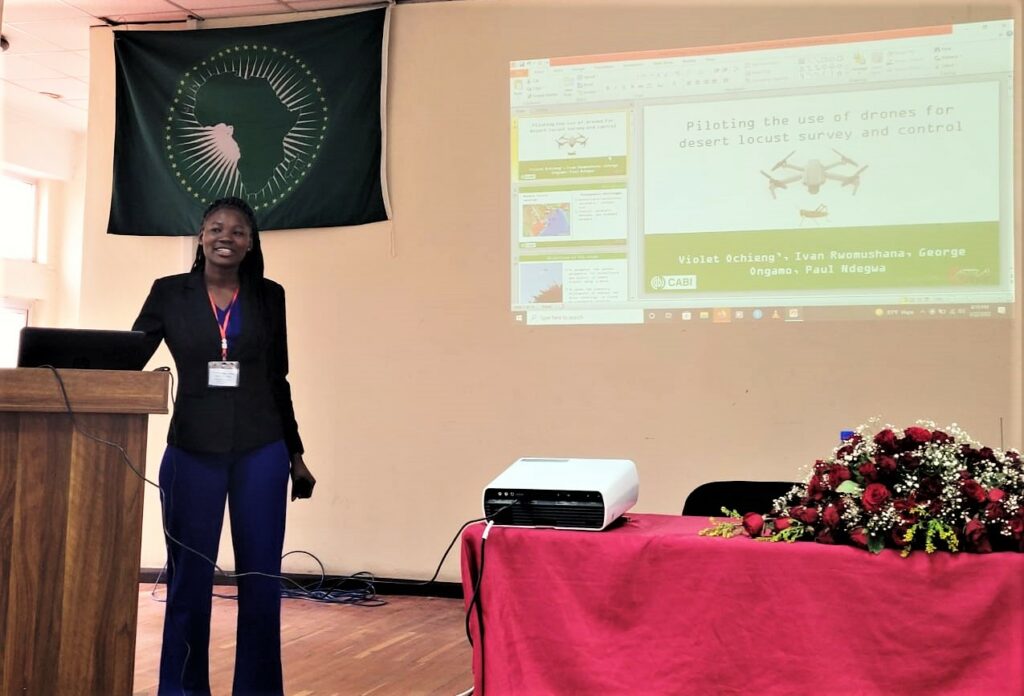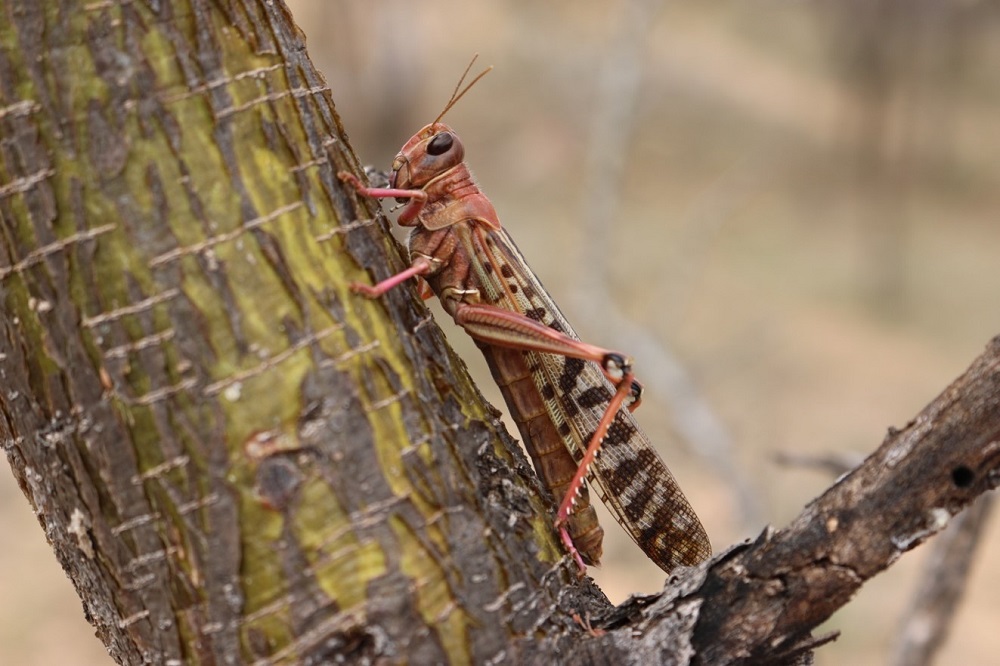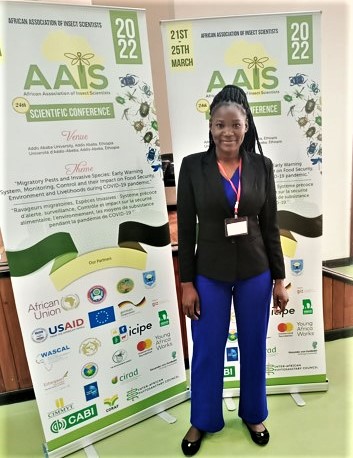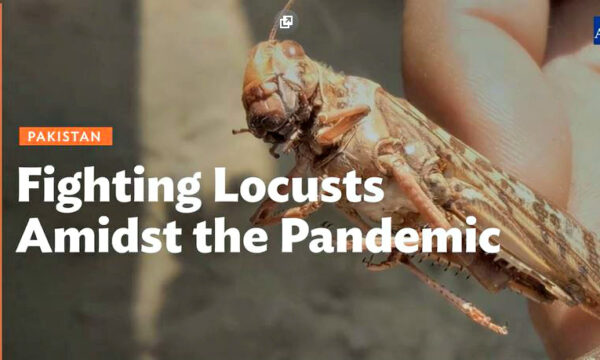
Violet Ochieng is the first winner of the inaugural Carol Ellison Science Award 2021 which is awarded to a student doing her/his research with CABI – with the objective of enriching their research experience with the organisation. Violet, from the University of Nairobi, is being supervised for her PhD by Dr Ivan Rwomushana – CABI’s Senior Scientist, Invasive Species Management based at CABI’s regional centre for Africa in Nairobi.
In this article, Violet, in her own words, speaks of her experiences at the 24th Scientific Conference of the International African Association of Insect Scientists – her first attendance at such as event – where she presented her research on piloting drones for the surveillance and control of the devastating desert locust (Schistocerca gregaria).
Promoting insect science – privileged to present
I had the privilege of presenting my research paper on piloting the use of drones for desert locust surveillance and control that I wrote under the supervision of Dr Ivan Rwomushana. I was thrilled and poised to experience my first participation in an international scientific conference and set out to share my research with the world. My interest and speciality in insect science anchor on the fact that insect research increasing contributes to agricultural productivity, a source of income and livelihood for many households in Africa.
The African Association of Insect Scientists (AAIS) conference is held once every two years. The first hybrid scientific conference was hosted by Addis Ababa University in Ethiopia in 2022. Themes covered at the conference included the monitoring, surveillance and control of desert locusts and invasive species in Africa, plus the commercial and edible insects for improved livelihood and the impacts of climate change on insects in Africa.
The conference is spearheaded by the African Association of Insect Scientists- a Pan-African Association founded to promote insect science and its application in Africa, including promoting communication and exchange of information among members and affiliated companies.
Upon arrival at the conference venue, I was awed by the vast cultural diversity of the participants that were in attendance. The hybrid conference was attended by approximately 300 scientists from over 31 different countries.
Tackling desert locust

My presentation provided a brief background on the desert locust, and how the behavioural change in its native areas gave rise to recent waves and upsurges currently experienced across Eastern Africa.
I was excited to share my research findings, which point to the immense potential for use of drone technology to revolutionize agriculture by providing a more robust means of desert locust monitoring, early warning, surveillance and control. This was explained by how inadequacies and challenges in current methods of locust surveillance and control could be bridged and improved by drone technology.
My presentation stirred a lot of interest from other conference participants with many asking questions in plenary and a follow-up networking session. Many scientists were impressed with the idea of using drone technology for pest management and indicated their willingness to harness this technology and apply the knowledge shared in their research.

Encouraging science journeys
Over and above sharing my research, I was privileged to attend and listen to presentations from other research scientists in attendance at the conference. I met fellow insect scientists who shared their science journeys with me and the gaps in their various fields. They motivated me to keep raising the bar high, especially as a young upcoming woman scientist, whose innovative research is impacting the world by using drone technology to manage harmful insect pests.
I was further motivated during the conference when I was recognized as the best anglophone junior presenter. I couldn’t help but beam with pride as I was presented with the award which for me is a significant academic and research achievement.
This award renewed my passion to keep solving problems in agricultural production through research and continue disseminating actionable knowledge to those who need it the most as a way of improving food security and alleviating poverty in Africa.
Lessons learnt
My participation in the conference is a significant mark on my career path and I am convinced will shape my contribution to food and nutritional security in Africa. Among my key takeaways are that agriculture is indeed the back bone of the economy for many countries in Africa.
To harness its potential, we have to alleviate numerous challenges that we face sustainably, one of them being climate change which is contributing to the rise in migratory and invasive pests. Insect science plays a critical role in the monitoring and timely control of these invasive insect pests hence using innovations such as drones can help alleviate yield losses during agricultural production, consequently improving food security.
Next steps
I intend to train as a drone pilot and get certified with a flying license. This will enable me to explore other potential opportunities involving the use of drone technology beyond the scope of my current area of research.
The journey has just started and with passion, hard work, determination, outlined mission and vision, I believe I can change the world, and put a smile on the faces of farmers in countries struggling with pests, poverty and food insecurity while taking agriculture to another level.
Additional information
Main image: Recipient of the first Carol Ellison Science Award 2021 presented by CABI, Violet Ochieng presented her research on piloting the use of drone for desert locust surveillance and control (Credit: CABI).
Associated blog
See also the blog ‘Deploying drones to tackle desert locust swarms in East Africa’ which highlights in more detail the deployment of drones as part of research involving Violet Ochieng, CABI and the University of Nairobi together with Frontier Technologies Livestreaming and Astral Aerial Solutions.
About the Carol Ellison Science Award
The Carol Ellison Science Award is named after the late Dr Carol Ellison who for over 30 years was a was a scientist in the field of biological control of invasive species at CABI. It was awarded for the first time in 2021 to Violet Ochieng. It is awarded to a student doing her/his research with CABI, or an early career CABI researcher, with the objective of enriching their research experience at CABI.
2 Comments
Leave a Reply
Related News & Blogs
CABI shares expertise in drone management of insect pests at Entomology 2023
CABI has shared its expertise in drone management of insect pests at the Entomology 2023 conference which was hosted by the Entomological Society of America (ESA). The conference, which took place in person at the Gaylord National Resort & Conventi…
8 November 2023





Congratulations girl and keep it up.. I like this. It is the right way to go.. as agricultural scientists we need to ensure high production among farmers by educating then on how to control these pests..
Congratulations 👏 Violet..aim higher.The sky is the limit.Am happy for you as you try to find solutions to problems facing agriculture in Africa.